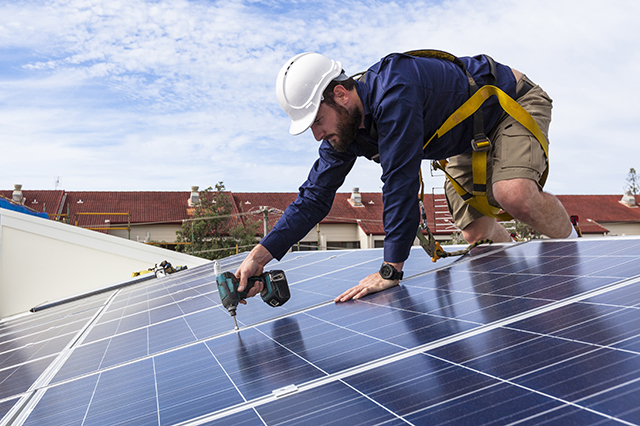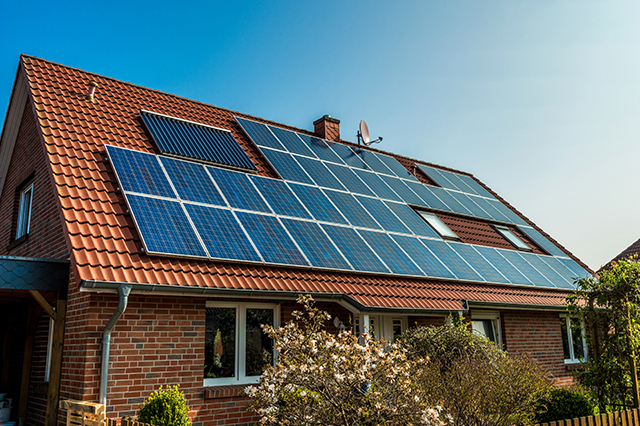Solar panels have been installed in US homes since the ‘80s, but they’ve only become popular as an energy source in recent years. Although they used to be expensive and clunky, solar panels are becoming cheaper and more efficient every year. Is solar energy a wise investment for your home? We’ll go over the basics of solar panel installation and maintenance so you can decide if it’s a good choice for you.
The price of solar panels
Although solar panel installation can be a little pricy initially, your costs will be offset by your electricity savings down the line. Of course, this is all depends on how much roof space or available ground space you have to power your home. If you have enough space for your energy needs, your electricity bill will go down to almost nothing.
Ideally, you want your panels to face south to harness the most direct sunlight. However, if you live in a city with little sunlight, like Buffalo, NY, you might want to talk to a specialist to see if installing solar panels will pay off. And even if your town receives a lot of sunlight, make sure there are no trees covering your roof with shade in certain parts, as this will cut down on the amount of energy you can harness.
Financing your solar panels
Since the cost of solar panels seems to be falling every year, it might seem like a good idea to postpone installing solar panels indefinitely until the price is more reasonable. However, this might not actually be the best approach if you want to save money. Basically, the longer you delay the installation, the more savings you miss out on in terms of your electricity bill.
In addition, as solar energy becomes more popular, there will be less tax incentives and rebates. The federal tax credit for renewable energy like solar is 30 percent now, but this will definitely be reduced as more homes go solar around the country. Since solar energy has become so popular in California, their $10,000 rebates have become a thing of the past. So if you’re considering going solar, now might be the best time. There are even some solar power loans which operate with no money down, so most households should be able to find a plan that works for them.
Consulting with a solar panel installer
When trying to compare the installation costs for different solar energy companies, things can get a bit confusing. You’ll want to determine how efficient the panels are in order to determine if the price makes sense for each company you consult. For instance, if one company proposes a higher per-watt rate for a 200-watt panel, while another has a lower per-watt rate for a 320-watt panel, you’ll want to reconsider whether the former is really a smart choice. It’s also a good idea to look into some third-party resources available online, like calculators, which allow you to see an unbiased estimate of how much energy solar panels would produce at your location.

Solar panel maintenance
Solar panels are extremely hardy and are built to last through snowstorms, heavy rain and high winds. Not to mention they also protect your roof from damage! Most of the time, solar panels come with a 20-25 year warranty. Fortunately, solar panels also don’t require much in the way of maintenance, and don’t even need to be cleaned often. In the event that there is an issue, it can usually be resolved by a solar installer in one visit.
However, if your roof is relatively old or flimsy and you think it may need repairs a few years down the road, it’s best to get this taken care of before installing solar panels. It’s much more of a hassle and costlier to have to remove your newly installed solar panels because there’s an issue with your roof. Also, some cities actually restrict the use of solar panels for aesthetic reasons, so make sure you do your research ahead of time to avoid any costly complications!
Solar panels and your electricity bill
Usually, solar-powered homes stay connected to the electrical grid, as it’s difficult to power your home entirely with solar energy 24/7 at this point. However, if your solar panels produce more energy than necessary, you’ll receive a net metering credit on your electricity bill, which will help you cut costs even more. As an off-the-grid alternative, solar batteries can be used to store energy, but they’re often expensive.
Solar panels are a great sustainable energy source for your home, but make sure you do plenty of research on your location and installation company.
Have you had solar panels installed and want to offer some advice to new buyers? Be sure to share in the comments!
One Thought on “Everything You Need to Know About Solar Panels”
Leave A Comment
Comments are subject to moderation and may or may not be published at the editor’s discretion. Only comments that are relevant to the article and add value to the Your AAA community will be considered. Comments may be edited for clarity and length.
















unlike Massachusetts, Rhode Island doesn’t allow homes to have batteries in the home to save excess energy produced by the solar panels. During a power failure, you also are without energy because all the energy your system produces goes directly into the grid not your home. When will they be installing roofing shingled that are actually individual solar panels ?